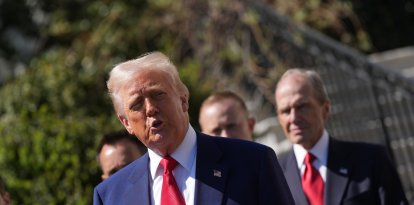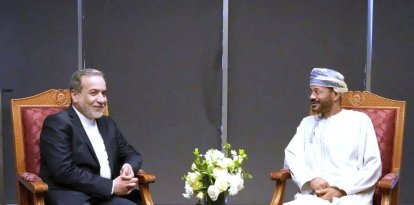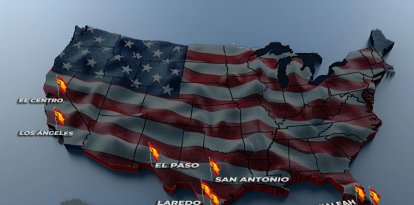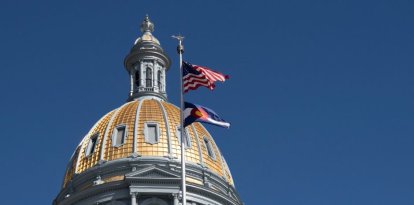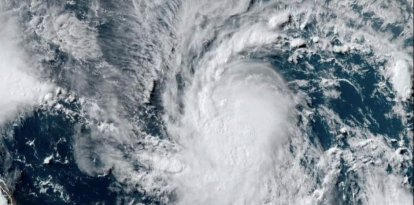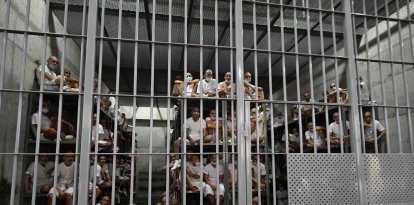In the trenches: How progressive politicians, NGOs and public officials are gearing up to wage war on Trump
The opposition to the president-elect is preparing guidelines, finalizing alliances and rallying citizens with eyes on the Jan. 20 inauguration. "Starting on day one, we’re ready to fight."
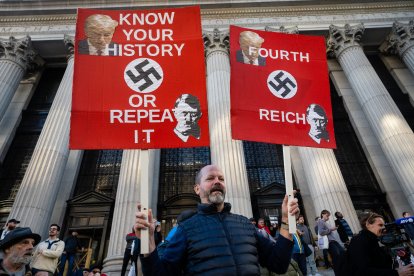
Anti-Trump protest
President Donald Trump has begun filling the positions in his impending administration with names. Susie Wiles, Tom Homan, Stephen Miller... The goal, as his team advances during the campaign, is to be ready to work from day one. On the left, they don't want to be left behind.
After the election, with the Democratic Party beheaded, divided and without a clear direction, the idea of mounting a "resistance" is emerging as a possible unifier of the opposition. The goal is to undermine the political, legislative and judicial field so that the Trump administration must battle inch by inch.
To describe their plan of action, these politicians, officials and NGOs often resort to combative, even warlike terms.
California the spearhead?
The first call to arms came from California: "California is ready to fight," stated Governor Gavin Newsom in announcing that he had called a special session to "help bolster our legal resources and protect our state against any unlawful actions by the incoming Trump Administration." That was just two days after the election.
"Newsom is eager to present himself as the savior no one is asking for," the California Republican Party (CAGOP) responded in a statement. His belligerent words, they said, show how disconnected he is from California politics. His sights are set on the White House.
They also took aim at Democratic Attorney General Rob Bonta, "who is focused on replacing Newsom as governor." Bonta also said in a press conference that his office had undertaken preparations to "defend The Golden State for the next four years and beyond."
But California is far from the only state digging trenches.
Governors on the warpath
In Washington, governor-elect Bob Ferguson announced that his team had been studying Trump's election proposals for months. "We knew from our extensive experience during his first term that we would need to be prepared from Day 1 if he were elected," said the current state attorney general. Even, he specified, they were going over Project 2025 "line by line."
Similar words were heard from Arizona, Minnesota, Illinois and Colorado. The governors of the latter, J.B. Pritzker and Jared Polis, even announced a new coalition of peers to oppose the next executive: Governors Safeguarding Democracy (GSD).
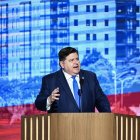
Politics
Illinois: Pritzker uses trans people to position himself as leader of anti-Trump movement
Alejandro Baños
The governors who sign up for the alliance (at the moment, only the two of them) will appoint networks of senior advisors who will collaborate with each other. On its website, it claims it will engage in three tasks: devising strategies to "protect the rule of law in the states," "reinforce key state institutions," and develop guidelines for other governors to emulate.
With much still to be defined (such as the sources of its funding), at least its objective is clear: to create a common front against Trump.
Internal resistance?
Another front could be emerging within the federal government. Although as a rumor, it is difficult to magnify. It is barely ascertainable from statements transcended in the press about the bowels of federal agencies and departments.
"The more likely scenario is they just undercut him and wait him out," analyst Raymond James, who worked in Health and Human Services during 'Trump I,' said of Robert F Kennedy Jr. "There are a gazillion ways" to do it, he added in conversation with Axios. That's largely true: POTUS-elected political appointees need career civil servants to implement their goals.
After speaking with dozens of public employees and political appointees, Politico asserted that "a number of officials" were debating between "the conflicting desire to stay in government and defend the mission of the agencies they work for." Basically, it is "fight-or-flight," as it said in the title of the piece.
"You need career people there to make sure that the maniacs in charge just can’t, like, run roughshod over federal laws and DOJ practice," said a lawyer in that department in another article for the same outlet. Norm Eisen, a frequent Trump critic, agreed: "They should absolutely stay." Stay and resist their new bosses.
This is exactly what Mark Paoletta, a lawyer on the Republican transition team, referred to. While he noted that "there are superb career employees in the U.S. government," there were instances of internal opposition during Trump's first term. Those who disagree, he argued, "should leave or be fired."
"The duty of a lawyer is to promote the objectives of his client within the bounds of the law, not to substitute his views for those of the client," he asserted. While they can "respectfully suggest alternative actions," once the president gives an order their job is to carry it out.
"Under the Constitution, the People vested ALL executive power in the PRESIDENT, not in the unelected lawyers who are to assist him in the exercise of that power."
Activist institutions
"Starting on day one, we’re ready to fight." The progressive organization ACLU does not mince words: "We've Seen 105 Years and 19 Presidents. Trump's Gotta Get Past All of Us."
Even before Nov. 5, the ACLU began preparing for a possible victory by the Republican, who, it claims, promotes a "dystopian view of American life threatens our fundamental freedoms."
During his first term, the group triggered 434 legal challenges. For the second, they devised a roadmap: "The Trump MEMOS." Throughout 130 pages, they unpack what his response will be like in Congress, the courts and the street to immigration, criminal, health and other measures.
One of the most litigious NGOs in the country, it claims to have more than 50 local offices across the country. It also claims to have more than 4 million members. All have a role in "The Trump MEMOS."
Another organization preparing its arms is Democracy Forward. In the first Trump administration, it filed some 100 legal challenges. Its website now greets the visitor with a message from its president, Skye Perryman: "When the Trump-Vance Administration breaks the law or violates the Constitution to the detriment of people and communities, we are prepared to take them to court."
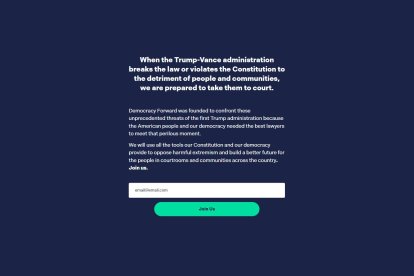
Democracy Forward website
"We knew Trump could win and that is why we helped lead a movement wide effort to plan for this moment," National Immigration Law Center President Kica Matos pleaded the day after the Republican victory.
"There is too much at stake in the months ahead to succumb to despair. Instead, we will come together, lift up the courage and resilience of immigrant communities, and fight back with everything we have."
Black Lives Matter has similar rhetoric: "This is a call to the battlefield." In a recent letter to its supporters, BLM Grassroots asserts that "the vast majority of white voters" returned Trump to the White House and that, in addition to a "setback," it is a "clarion call."
"We must redouble our commitment to do the vital work of organizing," it says, before asserting that its "fight has never been dependent on who occupies the White House."
"We reject the fascism and white-supremacy embodied by Donald Trump and his future administration and reaffirm our promise to mobilize and confront every policy, practice, and structure that perpetuates racial injustice and state-sanctioned violence," BLM Grassroots said.
War games
In May and June, the Democracy Futures Project and Brennan Center for Justice put 200 former officials, activists and retired military personnel through simulation exercises of a second Trump administration.
The simulation began with the inauguration. Participants divided up roles: members of the administration team, opposition, activist leaders. "Trump" announced measures, and they responded from their characters.
This is how Rosa Brooks, a Georgetown professor, recounted it in "The New Republic." Those "war games," as she called them, "were not reassuring."
From these exercises, Brooks recommends a series of tactics: she discourages litigation while promoting actions from the "realm of politics and culture"; discourages mass protests on streets and campuses (they "consistently backfired"); encourages people to "throw sand in the gears whenever possible," for example with objections from civil servants and active military; and calls for the establishment of a central, hierarchical command that coordinates the opposition.
In one of his most striking pieces of advice, she calls to abandon some leftist causes in pursuit of broader unity: "The left needs to ease up on cancel culture, rigid purity tests, and petty identity politics."
All troops to their battle stations...
RECOMMENDATION
